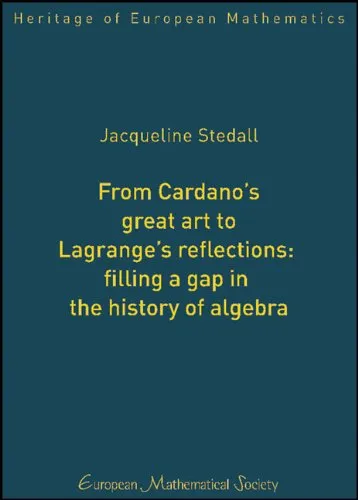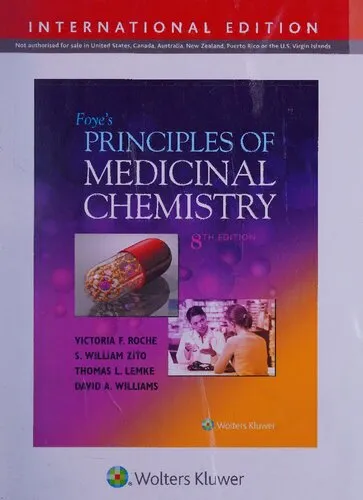From Cardano's Great Art to Lagrange's Reflections: Filling a Gap in the History of Algebra (Heritage of European Mathematics)
4.6
Reviews from our users

You Can Ask your questions from this book's AI after Login
Each download or ask from book AI costs 2 points. To earn more free points, please visit the Points Guide Page and complete some valuable actions.Related Refrences:
Introduction to 'From Cardano's Great Art to Lagrange's Reflections: Filling a Gap in the History of Algebra'
The history of algebra is a story of ideas, genius, and transformation. From foundational approaches to complex abstraction, algebra has captivated mathematical minds for centuries. In 'From Cardano's Great Art to Lagrange's Reflections', I aim to delve deep into a specific, extraordinarily rich period in this history, spanning the 16th to the 18th century. This book primarily focuses on the evolution of algebraic thinking during this time and uncovers how pivotal contributions woven together in these centuries shaped modern algebra. My goal is to address a noticeable gap in the historical narrative and bring to life the works of great minds like Gerolamo Cardano, François Viète, René Descartes, and Joseph-Louis Lagrange, capturing the essence of their revolutionary ideas.
This book is not merely a recount of historical events; it is an exploration of mathematical innovation. It begins with Gerolamo Cardano's influential work Ars Magna (The Great Art) from 1545, a seminal text that formalized the solutions to cubic and quartic equations. From there, it travels through the algebraic advances championed by Viète's symbolic methods and Descartes' revolutionary unification of algebra and geometry. Finally, it culminates in the profound reflections of Lagrange, whose innovative work laid the foundation for group theory and the systematic study of polynomial equations.
By carefully investigating how algebra evolved from being a collection of computational rules to becoming an abstract, symbolic language, the book illustrates the intellectual effort and ingenuity behind these leaps. At its heart, this book seeks to celebrate not just the mathematical results but also the methods, philosophies, and persistence of the mathematicians who created them.
Detailed Summary of the Book
The book opens with an in-depth study of Gerolamo Cardano's Ars Magna, a text that marks the beginning of algebra as a distinct mathematical discipline. Cardano’s introduction of solutions to the cubic equation and his innovative approach to higher-degree polynomials were nothing short of groundbreaking. The mathematical genius and occasional controversy of Cardano’s life also provide a colorful backdrop to the central theme of intellectual discovery.
The narrative then shifts to François Viète, widely recognized for his development of symbolic algebra. In contrast to the rhetorical style of algebra used by his predecessors, Viète introduced new notions of notation, enabling mathematicians to express general equations explicitly with symbols instead of words. This shift, examined in detail, made algebra more conducive to generalization and abstraction, and laid the groundwork for future advancements.
René Descartes takes center stage in the next section, where his geometric interpretation of algebra invigorates mathematical progress. The interplay between geometry and algebra in Descartes’ work, particularly in his La Géométrie, symbolizes a monumental shift in mathematical thinking. The unification of these branches not only expanded the scope of algebra but also influenced mechanics, engineering, and physics.
The final chapters bring us to Joseph-Louis Lagrange, whose meticulous reflections on polynomials and permutations prefigured the rise of modern algebra, particularly group theory. Lagrange’s influence on solving higher-degree polynomial equations, as well as his philosophical contributions to algebraic thinking, crown this historical journey of mathematical innovation.
Key Takeaways
- The transition of algebra from a practical tool for solving equations to a powerful abstract framework.
- The essential contributions of great mathematicians such as Cardano, Viète, Descartes, and Lagrange to the field of algebra.
- The vital importance of notational systems and the evolution of mathematical symbols in advancing abstract thought.
- The role of geometric intuition in reshaping algebra through works like Descartes' La Géométrie.
- An appreciation for the historical context in which mathematical ideas developed, allowing for a richer understanding of modern algebra.
Famous Quotes from the Book
"Cardano's Ars Magna is not just a book of solutions—it is a manifesto for mathematical creativity, where ancient techniques meet bold new ideas."
"Viète did not merely solve equations; he reimagined the language of algebra, liberating it from the confines of words and engraving it in symbols."
"For Descartes, algebra and geometry were not separate disciplines but two perspectives on the same mathematical truths."
"In Lagrange's reflections, algebra begins to transcend its roots and glimpse its future as a framework for systematic abstraction."
Why This Book Matters
Algebra lies at the heart of mathematics, and understanding its history sheds light on the evolution of human thought. This book is significant because it bridges an important gap in that history, presenting a cohesive narrative of algebra’s transformative period. By highlighting the contributions of key figures and exploring their ideas in depth, the book offers readers insights into how mathematical knowledge develops, adapts, and progresses.
Moreover, this work goes beyond technical achievements to explore the philosophical implications of their contributions, revealing the broader intellectual legacy of algebra. It serves as an indispensable resource for mathematicians, historians, students, and anyone fascinated by the history of ideas. At its core, this book reminds us that mathematics is not static; it is an ever-evolving subject shaped by the creativity, hard work, and vision of individuals throughout history.
Free Direct Download
You Can Download this book after Login
Accessing books through legal platforms and public libraries not only supports the rights of authors and publishers but also contributes to the sustainability of reading culture. Before downloading, please take a moment to consider these options.
Find this book on other platforms:
WorldCat helps you find books in libraries worldwide.
See ratings, reviews, and discussions on Goodreads.
Find and buy rare or used books on AbeBooks.
1166
بازدید4.6
امتیاز0
نظر98%
رضایتReviews:
4.6
Based on 0 users review
Questions & Answers
Ask questions about this book or help others by answering
No questions yet. Be the first to ask!






![The Ultimate iOS Interview Playbook: Conquer Swift, frameworks, design patterns, and app architecture [Team-IRA]](https://s3.refhub.ir/images/thumb/The_Ultimate_iOS_Interview_Playbook__Conquer__29925.webp)







